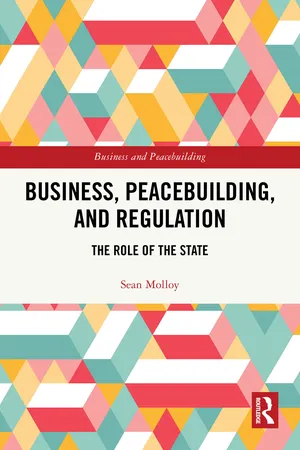
- 212 pages
- English
- ePUB (mobile friendly)
- Only available on web
About This Book
This book examines the relationship between business-based peacebuilding and the opportunities that emerge from the pluralisation of regulation. The core message is, notwithstanding the broad range of regulatory initiatives and actors that exist in conflict-affected settings, the state should assume responsibilities for defining the types of contribution that business can and ought to make to peace. It also demonstrates how the state, through different forms and methods of regulation, is well-placed to engage businesses to do so. It is particularly concerned with the potential for regulation to help address what is identified as a state of optimistic uncertainty in the field of business and peacebuilding. On one level, there is a sense of optimism around the types of contributions that businesses can and often do make as agents for peace. On another, there are varying degrees of uncertainty surrounding the actual peacebuilding impacts of business activities; how businesses are to understand the ways in which to make these contributions, and why businesses would do so. Regulation, this book will argue, can play an important role in bridging the chasm between optimism and uncertainty. This book will be of interest to those engaged not only with business and peacebuilding but also business and human rights, business and development and business and the environment. Moreover, this book is also of contemporary interest in other ways – the aftermath of the Ukranian conflict, as an example, will require a concerted effort to rebuild that society after war. Private sector actors could be a powerful vehicle for reconstruction and development and this book examines how regulation can be used to facilitate businesses involvement in peacebuilding efforts.
Frequently asked questions
Table of contents
- Cover Page
- Half Title page
- Series Page
- Title Page
- Copyright Page
- Contents
- Abbreviations
- Acknowledgements
- 1 Sketching the Business and Peace Terrain
- 2 Businesses, Peacebuilding, and Optimism
- 3 Businesses, Peacebuilding, and Uncertainty
- 4 From Regulation to Regulatory Pluralism
- 5 Northern Ireland
- 6 South Africa
- 7 A Future for State-Based Regulation of Business and Peace
- Bibliography
- Index